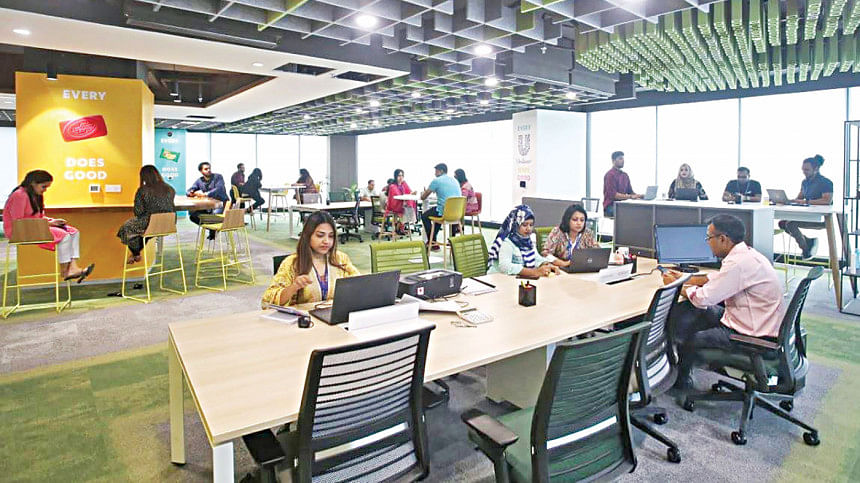South Asia, Bangladesh talent factory

Unilever is operating in the South Asian markets of Sri Lanka, Pakistan, Bangladesh, India, and Nepal. And each of the markets, including Bangladesh, has talents who are very attractive.
In the case of Bangladesh, it is very clear.
Unilever has been running a global competition for young students under a programme, Unilever Future Leaders League, for the last 10 years. And Bangladesh has been in the final round for five years, more than any country.
The participants from Bangladesh emerged as the global champion twice, including this year.
"It really speaks volumes of the fact that the time of South Asian talents, Bangladeshi talents is here. And with that awareness of opportunities and what global exposure can give you, there is no stopping our talent," said Anuradha Razdan, vice-president for human resources at Unilever South Asia, during an interview with The Daily Star.
She calls Sri Lanka, Pakistan, Bangladesh, India, and Nepal talent factory.
Razdan, also a member of the management committee of Hindustan Unilever Ltd as the executive director for human resources, visited Dhaka last month.
During the conversation, she talked about Unilever's business operation during the onslaught of the coronavirus pandemic, which, to her, was probably the most testing time.

The company tied up quarantine and telemedicine for its employees and became flexible to work to continue operation and supply its products, a number of which are related to personal and household hygiene needed to fight the rogue virus.
She also talked about the importance of work-life balance and ensuring gender parity in Unilever, including Bangladesh where the ratio of women employees increased to 40 per cent from 10 per cent four years ago.
"The road to 50 is very clear," said Razdan.
She believes that people have more potential than they realise.
"Therefore, when you get the right opportunity and support, you can light that spark. I have benefited from it in my career and that is what I want to do in my career every day."
Razdan began her career as a management trainee at Hindustan Unilever Ltd in 1999.
She said the multinational company has created a work culture and atmosphere in its overall human resources management with a view to ensuring that an employee has the totality of experience.
With a 52-billion-euro turnover in 2021, the fast-moving consumer goods maker has 148,000 employees worldwide.
And because of its process of identifying talents, Unilever has become the employer of choice in South Asia. In Bangladesh, Unilever has been the employer of choice over the last decade.
"I think that is the very fulfilling moment in my life because being an employer of choice and having that blind product win when you launch a brand," said Razdan.
There are a lot of things that Unilever does to attract talent.
"It is not any one thing. It is like a sauce that has a lot of ingredients that make it magical," she said.
"The important thing is how we keep a relationship with talent even before they join Unilever."
It has programmes like Sparks. In Bangladesh, it has competitions like BizMaestros.
"These are household names amongst university students because they give them the opportunities to understand and interact with the organisation even before they come," Razdan said.
The FMCG company, having 400 brands worldwide, does this because it wants to ensure that young talents make the right choice.
"We want talents who join us to be passionate and truly brought into what we stand for as an organisation just as much as we want to make the right choice and selection," she said.
"Unilever selects those youths who bring in the best functional competence and domain expertise and who have leadership capabilities."
The multinational company, which has been operating in Bangladesh since 1964, globally runs the management training programme named Unilever Future Leaders Programme, which is now in its sixth decade.
"It is also about consistency. We don't compromise on the rotations. We don't say that we have a vacancy in business and let's take a trainee out of their rotation. It's just consistency, making sure that they get feedback, they have a framework of coaches, mentors who support them and then get on with their career."
According to Razdan, international experience is an important part of growing leaders, and eight out of 10 people in the management committee of Unilever Bangladesh have international experience.
"So, it is a combination of a number of things that really give us the edge," said Razdan, who worked at the Unilever headquarters in London in various positions from executive assistant to a former chief human resource officer and the head of Unilever homecare business globally.
She also led Unilever's talent attraction agenda globally.
Today, in the world of social media, LinkedIn and Glassdoor, where a person works and what type of organisation it is are easily available, she said.
"You can't fake it."
Unilever focuses on building a great employee experience, giving people big stretching jobs, rotation, depth of experience, international opportunities, and ensuring a great culture and atmosphere.
"You work with the best talents. You work in the space that is the best for you. You work with leaders who push you, who grow you," said Razdan.
She suggested that policy-makers start with early education and build skills relevant to the global context.
"Today, digital skills and data science are in demand. So, it is important to make sure that our talents have those skills built into their curriculum."
The third, according to Razdan, is giving people opportunities and networks, making sure that when needed, people have the affordability and the financial support, and setting policies so that they can take loans to go abroad and come back.
"The most important thing is to make sure that we have a lot of attractive opportunities in the country so that talents who go out want to come back. That itself is an impetus for talents."
For young, she said, it is vital to be true to oneself.
"Be true to who you are, have skills that will make you relevant in a global mindset, build that depth and experiences and exposure, put your hands up for experiences, and take a little bit of risk," she said.
"Don't be afraid of making a few mistakes. Today, the diversity of experiences makes a CV very attractive."
A believer in global exposure, she said going abroad for study or for sometimes to work really rounds one off.
"But I am also a believer of saying that come back to our country, come back to our region because this is where growth and opportunities are."
"Look at Bangladesh, it is on the world map. It is such an interesting and promising story of opportunity."


 For all latest news, follow The Daily Star's Google News channel.
For all latest news, follow The Daily Star's Google News channel. 



Comments